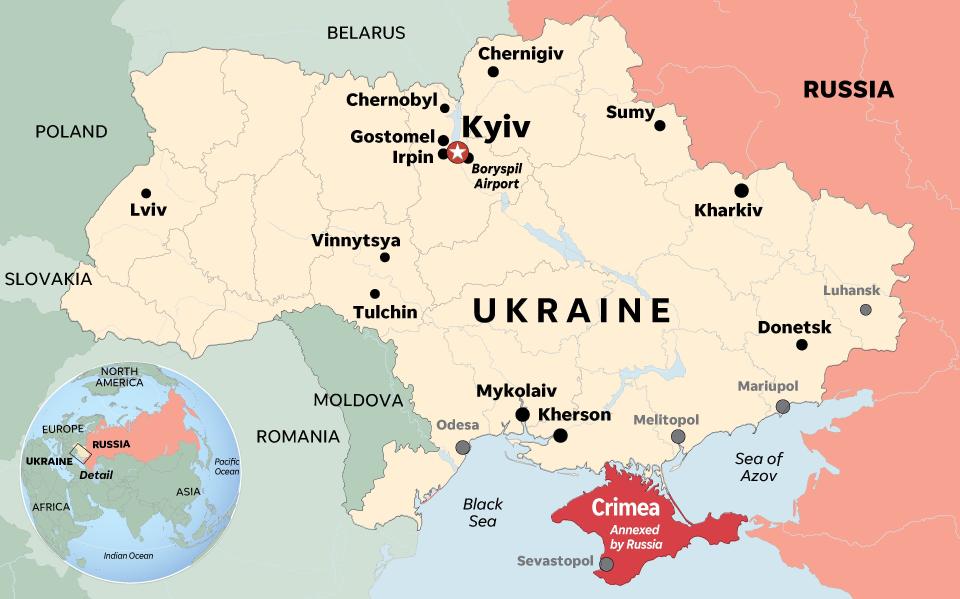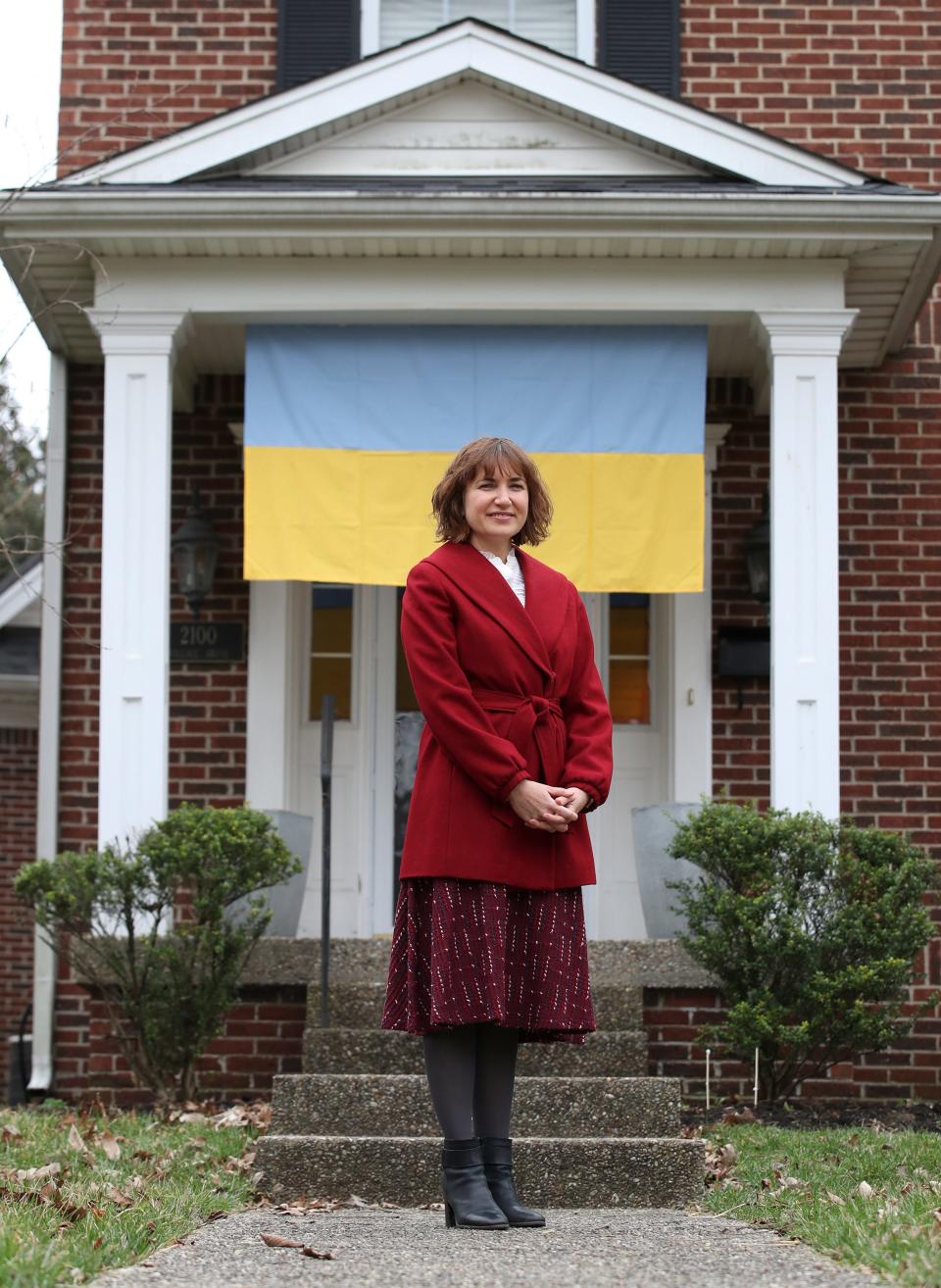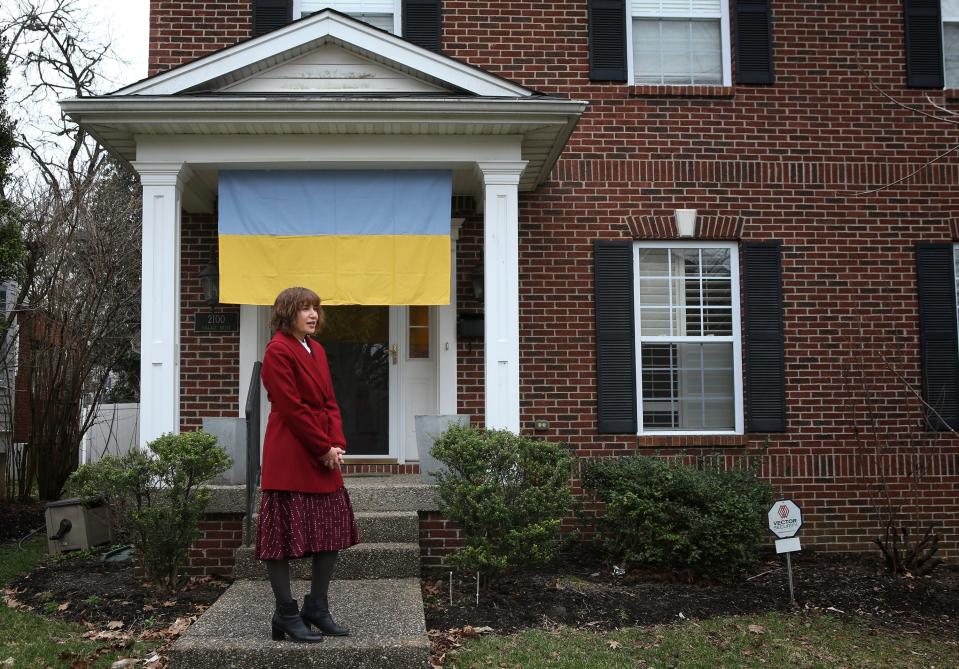'I spend my days in fear': Kentucky woman's brother trapped in Ukraine
LOUISVILLE, Ky. - They eat in the dark, sleep in their clothes and take turns keeping watch at night.
Air raid sirens randomly send them scrambling to a makeshift basement bomb shelter. Distant explosions leave them praying artillery is not headed their way.
During the day, they struggle to find food and medicine in a city where many lack electricity.
In their apartment in Kherson, a Ukrainian river port city of about 280,000 near the Black Sea, Yuliya Makiyevskaya’s brother, his wife, son and daughter-in-law are trying to survive in the first city occupied during the Russian invasion.

More than 5,400 miles away, Makyevskaya anxiously keeps in contact with them from her Louisville home, communicating through encrypted apps so the Russians don't discover their whereabouts.
She is one of many Ukrainian immigrants across the U.S. with relatives caught up in a war whose impact is rippling across the globe.
"I spend my days in fear for my loved ones," Makiyevskaya’s 58-year-old brother, Valeriy, texted his sister, who left Kherson for the U.S. when she was 14 years old.

'A complete state of terror'
More than 2 million Ukrainians have fled the Russian invasion. But military checkpoints and uncertainty over proposed humanitarian corridors have left Valeriy and his family stuck in place with many of their countrymen.
Despite reaching out to elected officials and groups aiding refugees, so far she’s been able to offer little more than moral support.
"My family is in a complete state of terror," she said.
'My heart is breaking': Louisville Paralympian born in Ukraine speaks about Russia
Makiyevskaya, 39, who works in information technology, manages to keep in touch daily with her relatives through encrypted apps.
Her brother agreed to answer several of The Courier Journal's questions through her, but asked that his last name not be published for fear of reprisals.
Valeriy and Yuliya text on Skype or Telegram, avoiding cellphones because “there's a lot of fear about telecommunications being intercepted and listened to,” she said.
And they do so in Russian, which Makiyevskaya grew up speaking while learning Ukrainian in school as a second language — a sign of the area’s overlapping cultures.
“We have Russian and Ukrainian roots,” she said of her family.
But as Russian troops massed on Ukraine’s borders, she begged them to leave for another country or western Ukraine.
Her relatives initially believed the invasion wouldn’t happen — that the U.S. was exaggerating the threat.
Live updates: Russia assault stalls, US officials says; Zelenskyy to address Congress on Wednesday
'I am always on watch'
By the time the invasion seemed inevitable, it was too late to flee.
The family first heard the shelling amid days of fighting that left about 300 Ukrainian fighters and residents dead, Kherson’s mayor, Igor Kolykhaev, told the New York Times.
He confirmed the city had fallen on March 2 and that the fighting had disrupted gas, electricity and phone lines.
In their apartment block in Kherson, Valeriy said he saw Russian tanks and armored vehicles and exchanges of gunfire. Artillery zoomed overhead.
“Across from our home, snipers were on the roof of another residential building shooting at the street," he said by text. "That is why we were afraid to use lights and had to eat in the dark. The city announced a curfew and blackout."
According to a report by The Independent, the mayor warned residents not to provoke the Russian troops and said cars would only be allowed to enter the city to bring food and medicine and other essentials.
While major combat has moved on, the city remains tense. Valeriy and his family hear explosions in the distance and are unsure what they mean.
“We have not been sleeping, and I am always on watch. Whenever shooting is within earshot, I wake up (my) son, daughter-in-law and wife, so they can run to the hallway or the space between flats … or the building basement,” he said.
China and Russia: A 'cold-blooded' alliance? China could be a pivotal force in Russia's war against Ukraine
Protests in the streets
Russian state media reportedly called the fall of Kherson a “liberation."
But earlier this month, the BBC reported that there was a protest of about 2,000 residents waving flags, shouting slogans such as “Russians go home” to protest the occupation. Russian troops fired in the air to deter the crowd.

The family didn’t go. But Valeriy said a work colleague who did attend was hit in the leg by a ricocheting bullet.
Another protest broke out March 9, and Ukraine's military said more than 400 people were detained by the Russian National Guard, though it couldn't be independently confirmed. Protests reportedly continued to break out.
Meantime, Valeriy said many people in the city were without work. His tech factory was shuttered. His daughter-in-law lost her job when the shopping mall where she worked was destroyed by artillery and fire damage.
Worst still, he said, there is a shortage of "groceries or basic medications, specifically and importantly — insulin. Insulin used to be available for free, and now no money can buy it.”
Last week, the city's mayor said the city had a dwindling food supply, NBC reported. Other reports said people were sharing the names of stores or pharmacies that were functioning on the communication app Telegram.
On Saturday, Valeriy went out to shop, finding some stores still empty.
"They found some potatoes and bread from local independent vendors," Makiyevskaya said. "The most concerning thing is that all pharmacies are closed, and my brother will run out of life-sustaining asthma and heart medications in a few weeks."
The family says they are lucky to have water, electricity and internet access. Ukrainian journalists in Kherson, writing anonymously, reported in The Guardian that power in suburbs was being restored.
But the snowy streets were still full of Russian vehicles.
Feeling hatred for Russia
Another thing keeping the family inside: fear of Russian checkpoints.
Valeriy said one friend had to identify the body of his mother at a packed morgue after she took a car to a nearby village and was fired upon.
His son, in his 30s, worries about being conscripted by the Russian Army.

Just over 250 miles to the east, more than 1,300 people have died during Russia's siege of Mariupol, Ukrainan officials have said. Residents are desperate for food and fuel. They have no heat and many are without electricity in a place where nighttime temperatures regularly dip below freezing.
Makiyevskaya said the misery harkens back to World War II, when her grandmother hid in basement bomb shelters and Germany occupied the city. Her grandfather, who served in the Soviet Army, was killed in the war.
“That's why it's so unimaginable” to see Russia invading and fighting Ukraine, she said.
Her brother, despite the family’s Russian roots, said he now feels “nothing but extreme and indestructible hatred toward Russia. Nothing else.”
His son and daughter-in-law want to leave. But he and his wife are still “hoping that this nightmare will end” and the Ukrainian military will beat back the Russian attackers.
If not, he said, he will consider resisting as a “partisan.”
“I had a nice job which I loved. My wife did too. My daughter-in-law and son were also doing well," he said.
"Now, all we had is destroyed! We were working on remodeling our flat and now we don’t know how all this will end."
Chris Kenning can be reached at ckenning@gannett.com
This article originally appeared on Louisville Courier Journal: Kentucky woman secretly talks with brother trapped in Ukraine

